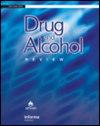Alcohol use in Iraq: Perceptions of interviewed students at three Iraqi universities
Abstract
Introduction
Iraq has faced decades of conflict and increased exposure to alcohol use. While the majority (60%) of Iraq's population is under the age of 24, there is no research examining their views on alcohol use and related factors. This study explores how the individual, interpersonal and social contexts of university students may influence their experiences and perceptions of alcohol use.
Methods
We undertook a qualitative study underpinned by a socio-ecological framework and the alcohol use motivational model. Forty students from 11 disciplines at three universities across Iraq were interviewed (45% female). Interviews were conducted in English (n = 3) or Arabic (n = 37). Template analysis was used to examine the data.
Results
Perceptions of the prevalence of alcohol use varied among participants. Perceived motives for drinking included using alcohol to cope with grief, loss, poverty and unemployment; as well as peer pressure, thrill-seeking and social approval. Abstinence was perceived to be associated with knowledge of the adverse effects of alcohol and a commitment to faith. Students reported alcohol use as a clandestine activity. Students suggested education, open communication and employment opportunities as preventative strategies.
Discussion and Conclusion
This is the first study to explore young Iraqi perceptions and experiences of peers' alcohol use in the current context of conflict, political instability and globalisation. Young Iraqis are a vulnerable population who may be at risk of alcohol-related harm. Iraq should consider multidimensional preventive approaches that include evidence-based and culturally appropriate interventions that reflect young people's real-life experiences and challenges.


 求助内容:
求助内容: 应助结果提醒方式:
应助结果提醒方式:


